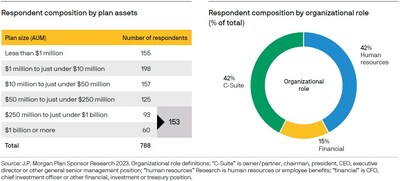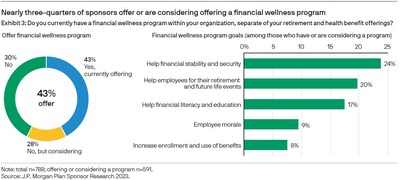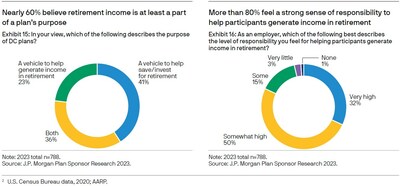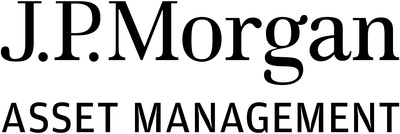J.P. Morgan Survey Shows Plan Sponsors Increasingly Focused on Delivering Expanded Benefits and Employee Financial Wellness Programs in DC Plans
- 85% of plan sponsors feel a strong sense of responsibility for employee financial wellness, up from 59% in 2013. 95% believe they are helping make sure employees have a financially secure retirement. 61% of respondents take a more proactive plan design approach, and a higher number of these plan sponsors view their plans as 'extremely effective' or 'very effective'. 6 in 10 plan sponsors offer a Target Date Fund in their DC plan, while 76% of sponsors with a Qualified Default Investment Alternative say it is a series of target date funds. Nine out of 10 'strongly agree' or 'somewhat agree' that it is important to offer investments that help participants generate income in retirement.
- Increased sense of responsibility for financial wellness, automation and customization, high usage of Target Date Funds, and focus on retirement income solutions bode well for the future of DC plans.
- None.
Insights
Analyzing...
The survey and resulting white paper, titled "Continued Progress through Partnership", draws on a decade of data tracking the evolution of DC plan sponsors' views and actions.
"Our enhanced 2023 Plan Sponsor survey highlights the industry shift as plan sponsors begin to recognize the interconnection of overall employee financial and personal wellness. Retirement income, student loan debt assistance and emergency savings programs are all being discussed more and it's exciting to see that companies offering these types of programs see their retirement plans as more effective," said Alexandra Nobile, Vice President, Retirement Insights, at J.P. Morgan Asset Management. "The implications of SECURE 2.0 serve to only accelerate this trend and we expect to see more plan sponsors taking a proactive approach to evolving their retirement benefit offering through innovative DC plan design."
Results from the 2023 Retirement Insights survey of 788 plan sponsors reveals four key themes:
1. Increased sense of responsibility for financial wellness
- In this year's survey,
85% of plan sponsors feel a strong sense of responsibility for employee financial wellness, up from59% in 2013. - Employee benefits are increasingly top of mind and more than seven out of 10 surveyed sponsors report offering employees life insurance, six out of 10 offer disability insurance and mental health benefits, half make health savings accounts (HSAs) available and just under half provide paid parental or caregiving leave.
- A quarter of surveyed sponsors offer student loan debt assistance, and
40% offer emergency savings benefits, one-on-one financial coaching and/or debt management assistance. - Sponsors with a financial wellness program more often see their retirement plans as effective in meeting key goals, compared with those without such a program.
95% believe they are helping make sure employees have a financially secure retirement.
2. Automation and customization continue to gain momentum
- In order to help drive stronger participant outcomes,
61% of respondents take a more proactive plan design approach, and a higher number of these plan sponsors view their plans as "extremely effective," or "very effective." - There has been an increase in the number of plans that now offer automatic contribution escalation, with
43% of surveyed sponsors reporting this feature, up from21% in 2013.6% are unsure if they offer automatic contribution escalation. - Still,
47% of surveyed sponsors continue to choose not to offer automatic enrollment in their plans (around2% are unsure if they offer), and51% do not offer automatic contribution escalation.
3. Target Date Fund (TDF) usage remains high as sponsors refine their investment menu
- 6 in 10 plan sponsors offer a TDF in their DC plan, while
76% of sponsors with a QDIA say it is a series of target date funds. - The most frequently reported investment menu changes were "added an option designed to generate income for retirees" (
45% ) and "reducing the number of investment options" (35% ). Around a quarter have changed their plan TDF suite and/or their qualified default investment alternatives (QDIAs). - Three out of four surveyed sponsors report feeling "extremely confident" or "very confident" that their participants have an appropriate asset allocation, led by proactive sponsors at
85% versus59% for sponsors with a participant-driven philosophy. Proactive sponsors are classified as those that actively implement programs that make it easy to tap into the benefits of the plan, such as automatic enrollment and contribution escalation, personalized communications, and investment defaults into TDFs and other professionally managed asset allocation strategies. - The increasing popularity of reenrollment may also be playing a part here, with
55% of plan sponsors having considered reenrollment, and more than a quarter having already conducted or planning to conduct a reenrollment in the next 18 months (up from7% in 2019). - Only
55% of surveyed sponsors know that they serve as a fiduciary, despite the fact that all of the respondents have fiduciary responsibilities.
4. Retirement income has become a core purpose of DC plans
- Nine out of 10 "strongly agree" or "somewhat agree" that it is important to offer investments that help participants generate income in retirement.
- For plans without a current retirement income option,
45% say that they are "extremely likely" or "very likely" to consider offering one in the upcoming year. - Six out of 10 surveyed sponsors believe DC plans should be vehicles for retirement income generation.
Key Implications for Plan Sponsors
- Continuing to evolve financial wellness offerings with SECURE 2.0 in place, just as we have seen advancement and innovation in other areas of retirement benefits design, will be beneficial for both participants and plan sponsors.
- Taking a more proactive approach to driving participant outcomes and continuing to move toward customization drives more favorable participant outcomes.
- The demand for retirement income solutions is present and growing, for both participants and plan sponsors, so we expect this will continue to be a key area of focus for the near future.
"Our research shows that DC plans have become the primary retirement savings vehicle for most working Americans, and in many ways plan sponsors have risen to the occasion, however there is a clear need for plan sponsors to better understand their role as a fiduciary, with just under half aware of their responsibilities," said Catherine Peterson, Global Head of Insights & Product Marketing, J.P. Morgan Asset & Wealth Management. "We expect to see a continued emphasis on incorporating retirement income solutions into DC plans going forward having been identified by plan sponsors as a core purpose of plans."
Methodology
To stay in tune with the goals, motivations and progress of employers as they continue to shape the evolution of their defined contribution plans, J.P. Morgan Asset Management undertook its fifth plan sponsor survey on this topic.
From January 9 through February 28, 2023, we partnered with Greenwald Research, a market research firm based in
Below are breakdowns of our sample of plan sponsors, both by plan assets and by their organizational role. Results aggregated across plan size categories were weighted to reflect the size distribution of plans in the
About J.P. Morgan Asset Management
J.P. Morgan Asset Management, with assets under management of
JPMorgan Chase & Co. (NYSE: JPM) is a leading financial services firm based in
J.P. Morgan Distribution Services, Inc., member of FINRA
Copyright 2023 JPMorgan Chase & Co. All rights reserved.
SOURCE J.P. Morgan Asset Management
![]() View original content to download multimedia:https://www.prnewswire.com/news-releases/jp-morgan-survey-shows-plan-sponsors-increasingly-focused-on-delivering-expanded-benefits-and-employee-financial-wellness-programs-in-dc-plans-301899742.html
View original content to download multimedia:https://www.prnewswire.com/news-releases/jp-morgan-survey-shows-plan-sponsors-increasingly-focused-on-delivering-expanded-benefits-and-employee-financial-wellness-programs-in-dc-plans-301899742.html
SOURCE J.P. Morgan Asset Management











